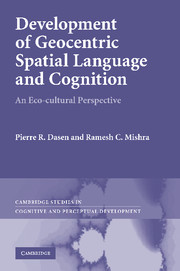15 - Discussion and conclusions
Published online by Cambridge University Press: 02 December 2010
Summary
Geocentric FoR as a cognitive style
After collecting all the information presented in the preceding chapters, what arguments do we have for presenting the geocentric FoR as a cognitive style? The question is indeed debatable. In those locations where the egocentric and geocentric frames clearly coexist, in Bali, Varanasi and Kathmandu, our answer is clear: “Yes”; the choice between the two frames is akin to a cognitive style. People have, as it were, the “choice,” insofar as they have at their disposal, at the linguistic and the cognitive levels, both of the frames, and, depending on the situation, they activate one or the other. Sometimes they even activate one, but explain it by the other, for example, when an item on an encoding task such as Animals produces an egocentric alignment, which is then explained in geocentric language. Most of the time, however, there is indeed coherence between the linguistic and the cognitive “choice.” The term does need to be put in quotation marks, because the decision is rarely conscious. Otherwise, the above-mentioned incoherent matches would not occur at all, or at least be exceptional, possibly as a result of distraction.
So, what we mean by “choice” is that individuals have in their possession the basic processes needed for either frame, in the same way as basic cognitive processes have been found to be universal in comparative cross-cultural psychology, as reviewed in chapter 1. Activating one process rather than the other is akin to a cognitive style.
- Type
- Chapter
- Information
- Development of Geocentric Spatial Language and CognitionAn Eco-cultural Perspective, pp. 297 - 322Publisher: Cambridge University PressPrint publication year: 2010



